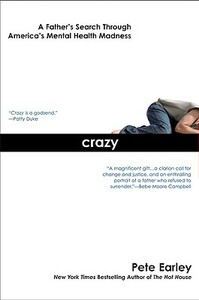Take a photo of a barcode or cover
challenging
dark
emotional
hopeful
informative
sad
slow-paced
I picked this book up because the topic hits close to home and I was interested in the topic. I did not plan to read much of it as I was reading another book also but then I found myself trying to find moments to read "just a little bit more". If I had, had the time I probably would have finished this in one day I really didn't want to put it down.
Earley really did a wonderful thing with this book and all the research he did and I can relate to his frustrates when it comes to people being so uninformed about the mentally ill and the way we treat them.
Thank you so much for writing this book and I truly hope your son is still doing well!
Earley really did a wonderful thing with this book and all the research he did and I can relate to his frustrates when it comes to people being so uninformed about the mentally ill and the way we treat them.
Thank you so much for writing this book and I truly hope your son is still doing well!
challenging
dark
emotional
informative
reflective
sad
tense
medium-paced
His investigative journalism is great, and the case he makes is poignant, but he presents a biased case.
He points out real problems with the system of revolving-door incarceration, uncaring courts, and poor mental health treatment, but his solution is repeatedly more funding for more policing and fewer rights and protections for the homeless and mentally ill. He claims to investigate both sides, but describes the sides with a clear bias, and doesn't give any time to concerns of the absuses that come from forced treatments.
Also, for all his compassion, he uses some truly dehumanizing language to describe people living with mental illness.
He points out real problems with the system of revolving-door incarceration, uncaring courts, and poor mental health treatment, but his solution is repeatedly more funding for more policing and fewer rights and protections for the homeless and mentally ill. He claims to investigate both sides, but describes the sides with a clear bias, and doesn't give any time to concerns of the absuses that come from forced treatments.
Also, for all his compassion, he uses some truly dehumanizing language to describe people living with mental illness.
5/5 — Man will reject straightforward, compassionate action out of a tragic obsession with slippery slope fallacies.
In the case of the mentally ill, Pete Earley demands us to question why parents, therapists, and doctors’ insistence on forced medication is rejected in favor of an individual’s civil liberty to remain mentally ill. This being the “protection” which has left hundreds of thousands of mentally ill individuals to experience the revolving door of hospitalization, imprisonment, and homelessness — a structural consequence of the 60’s mass deinstitutionalization movement, which with no alternative system in place, left the innocently insane worse off than anything cried out in Kesey’s One Flew Over the Cuckoo’s Nest.
Earley shares this masterful investigation of America’s mental health care crisis alongside personal experience navigating his college-aged son’s bipolar diagnosis. The doctors won’t medicate unless his manic son consents (which he will not do, given his illness does not permit such foresight), insurance providers won’t cover expenses they arbitrarily deem excessive (shocker: no room for preventative care), and judges will not intervene unless the victim is experiencing imminent violence toward themselves or others (already too late). His son is revealed to be among “the lucky ones,” who is responsive to medication, loved by attentive parents, and as the story unfolds, able to dodge the life-shattering felony charges that resulted from an episodic house break in.
The unlucky ones will be left unmedicated or unresponsive to medication, and thus treated as criminals. This group will go on to experience much of their lives in institutions designed to punish and watched over by correctional officers trained to oppress. Kindness approaches this group in superficial ways — legalizing parks admission after hours, permitting fires in public spaces, allowing the blockage of sidewalks — laws which may decriminalize homelessness for the mentally ill, but will not save them from the inevitable revolving door.
Pg 145 — “I’ve never had one person whom I’ve helped say, ‘Doc, I wish you would have left me crazy on the streets.”
In the case of the mentally ill, Pete Earley demands us to question why parents, therapists, and doctors’ insistence on forced medication is rejected in favor of an individual’s civil liberty to remain mentally ill. This being the “protection” which has left hundreds of thousands of mentally ill individuals to experience the revolving door of hospitalization, imprisonment, and homelessness — a structural consequence of the 60’s mass deinstitutionalization movement, which with no alternative system in place, left the innocently insane worse off than anything cried out in Kesey’s One Flew Over the Cuckoo’s Nest.
Earley shares this masterful investigation of America’s mental health care crisis alongside personal experience navigating his college-aged son’s bipolar diagnosis. The doctors won’t medicate unless his manic son consents (which he will not do, given his illness does not permit such foresight), insurance providers won’t cover expenses they arbitrarily deem excessive (shocker: no room for preventative care), and judges will not intervene unless the victim is experiencing imminent violence toward themselves or others (already too late). His son is revealed to be among “the lucky ones,” who is responsive to medication, loved by attentive parents, and as the story unfolds, able to dodge the life-shattering felony charges that resulted from an episodic house break in.
The unlucky ones will be left unmedicated or unresponsive to medication, and thus treated as criminals. This group will go on to experience much of their lives in institutions designed to punish and watched over by correctional officers trained to oppress. Kindness approaches this group in superficial ways — legalizing parks admission after hours, permitting fires in public spaces, allowing the blockage of sidewalks — laws which may decriminalize homelessness for the mentally ill, but will not save them from the inevitable revolving door.
Pg 145 — “I’ve never had one person whom I’ve helped say, ‘Doc, I wish you would have left me crazy on the streets.”
challenging
emotional
informative
medium-paced
challenging
dark
informative
reflective
medium-paced
informative
reflective
medium-paced
challenging
emotional
informative
inspiring
reflective
sad
medium-paced
This book is amazing. It is so eye-opening how one of the most defenseless groups in society are abused and neglected because they don’t have money and resources to protect themselves. It’s sad, frustrating, maddening, and infuriating to hear how abused people are either because they don’t have protection or they don’t have money.
Read or listen to this and open your eyes to what’s happening and think about how you can be part of a change for the better.
Read or listen to this and open your eyes to what’s happening and think about how you can be part of a change for the better.




